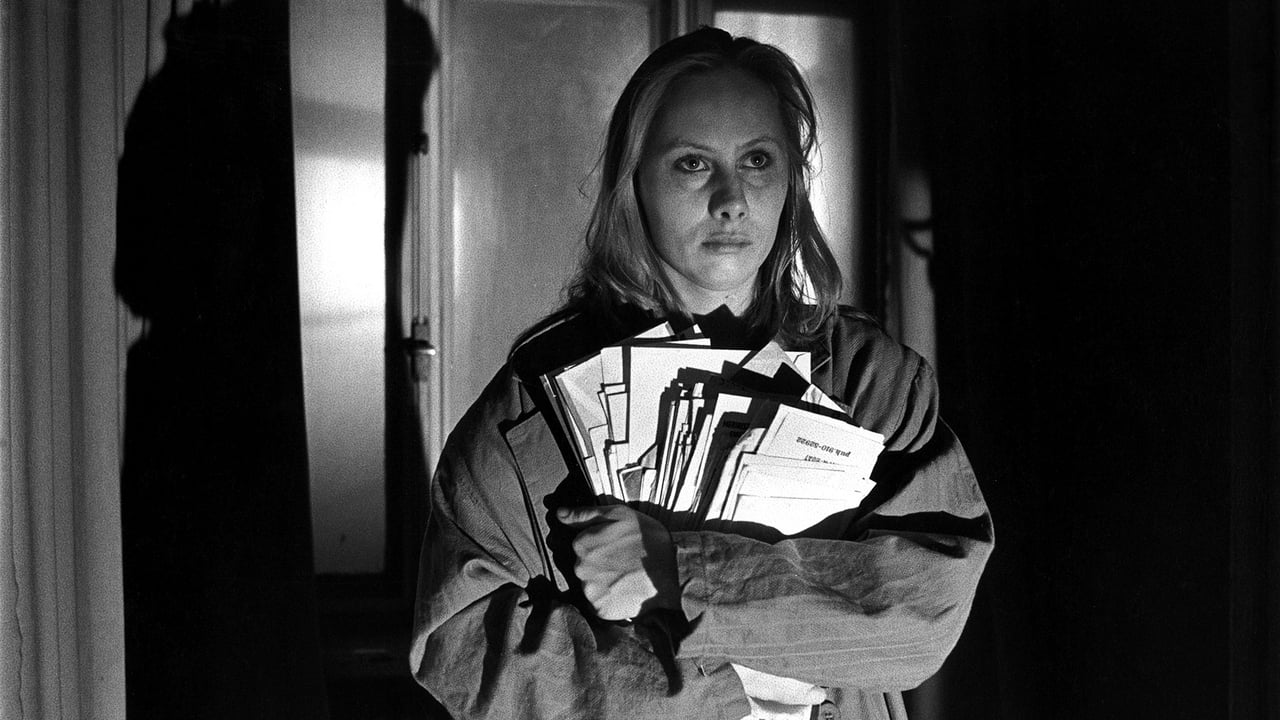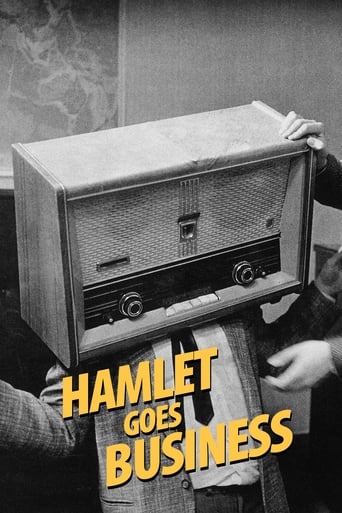Numerootno
A story that's too fascinating to pass by...
filippaberry84
I think this is a new genre that they're all sort of working their way through it and haven't got all the kinks worked out yet but it's a genre that works for me.
Clarissa Mora
The tone of this movie is interesting -- the stakes are both dramatic and high, but it's balanced with a lot of fun, tongue and cheek dialogue.
Myron Clemons
A film of deceptively outspoken contemporary relevance, this is cinema at its most alert, alarming and alive.
mistoppi
Like I wrote before reviewing Drifting Clouds, the actors in Kaurismäki's movies are very stiff. There's basically no emotion in the acting comparing to Hollywood movies. During Drifting Clouds I wasn't a big fan of that style, but it suits Hamlet Goes Business. It gives a certain contrast to the somewhat theatrical dialogue and the fact that this is based on a play. Also I was surprised to see how good Pirkka-Pekka Petelius was as Hamlet. He's mostly famous for being a comedian in many sketch shows, and this is honestly the first serious role I've seen him play. Of course this is a black comedy, a spoof of Hamlet, so the role is still not entirely serious.While I love most things about this movie, it's that ending that kind of bothers me. After seeing this film several times I'm already used to it, but it still feels very separate from the rest of the movie. It's added by Kaurismäki, which might explain that. I could go into lengths what bothers me about this, but I'd rather not make this review sound exactly like the analysis we did in class, and also I don't want to spoil you. The music chosen for this movie is amazing. The classical music and rock music go very well together. Most of the time there's a great harmony with what we see and what we hear, but even when there's not, it' amazing. And oh, the cinematography... Weird angles and crooked shots are so great. And of course the whole movie being in black and white amplifies the whole feeling. With colours, it wouldn't be the same film.Hamlet Goes Business is an amazing take on Hamlet, and a great satire on business world. While it's clear I will not like all of Kaurismäki's movies, I can appreciate his work and I'm glad I've found a favourite
Christopher Culver
Released in 1987 and therefore a fairly early effort by Aki Kaurismäki, HAMLET LIIKEMAAILMASSA ("Hamlet Goes Business") is the Finnish auteur's idiosyncratic adaptation of Shakespeare's classic play. Kaurismäki sets the drama in the corporate world of 20th-century Finland: a business magnate (Pentti Auer) is murdered by his wife Gertrud (Elina Salo) and brother Klaus (Esko Salminen) so that they can marry and take over the group of companies. The deceased's son Hamlet (Pirkka-Pekka Petelius), depicted here as something of a dim-witted manchild, discovers the dark secret of his murder and moves towards revenge. At the same time, he maintains a curious love affair with Ofelia (Kati Outinen), daughter of a high-ranking employee, and also scrapes with other characters drawn ultimately from Shakespeare's play.All of the main scenes from Shakespeare's play are present here, though sometimes (like the murder of Polonius) they don't make much sense in the context of the adaptation and are shown briefly to simply telegraph them. The dialogue is mainly original, though at times it switches into the traditional Finnish translation of Shakespeare's Elizabethan English to deliberately bizarre effect. There is however a laugh-out-loud twist ending going beyond the Shakespearean source material, which turns the film into a commentary on Finnish politics and labor relations.All of Kaurismäki's films are dark comedies, though with humor so deadpan it is sometimes easy for an audience to miss it entirely. Riffing on the image of the Finnish people as taciturn and emotionless, Kaurismäki's actors are directed to state their lines in a very dry, robotic fashion. The death of Ophelia, a tragedy for the ages, is depicted here in a humorous way entirely due to Kati Outinen's deft facial expression and an unusual prop I won't spoil here. Kaurismäki's love of early rock 'n' roll and blues is present in all of his movies, and you can also expect to see a jukebox kicked into life here and a band performing on stage at some point.While I am a fan of Kaurismäki and have seen nearly all of his many films, I don't think this is one of his major efforts. The black and white photography is a weak point. Kaurismäki loves utterly drab scenery and it is a big part of his aesthetic, but paradoxically color is necessary to bring this drabness across. It also feels like this is just one more adaptation of Hamlet, even if it's an unusual one, and none of the characters are as readily likable as in Kaurismäki's own original work. Most audiences will find his preceding effort VARJOJA PARATIISISSA (Shadows in Paradise) or his following film ARIEL to be more charming and visually seductive.
winner55
i saw this about a year after it first came out.It has become notorious for being somewhat flippant about it's source material (Shakespeare's Hamlet).Actually, I don't remember finding this very humorous at all. In fact, a darker version of the Hamlet narrative could hardly be imagined.This film represents an important historical turning point; although theatrical directors had been toying with the notion of "updating" Shakespeare, ever since Orson Welles produced a Broadway version of Macbeth with African Americans in the cast back in the late 1930s (When he made his own film version of MacBeth, he chickened out on this, unfortunately). But if the reader has seen the updated version of Romeo and Juliet out of Australia, or the Ethan Hawke Hamlet of 2000, or the recent "O" version of Othello (at last with black actors playing black roles, after all these centuries, for heaven's sake!), it all starts here.Unfortunately, as I say, this film is so incredibly dark, you'll want to know why Hamlet didn't just cut his throat - "To be, or not to be - oh, the hell with it!" Not for every taste, to say the least.
Edgar Soberon Torchia
What are you left with if you take most of the psychological motivations away from characters, and turn a story into a social tract? Shakespeare lovers and those who persist on "character development" better beware, as Kaurismaki (in my fourth incursion into his cinema) transforms the Danish prince into a horny, ruthless and spoiled rich heir, who writes bad poetry, is worried about his weight and has a terrible secret. I admit I don't like William Shakespeare much --I believe he's overrated-- so I rather enjoyed Kaurismaki's "irreverence". It is a hint that he does not even give credit to Shakespeare: this story has been told since late 12th century and apparently Thomas Kyd wrote a "Hamlet", before Shakespeare. Kaurismaki is more interested in speculating what may happen to a family like Hamlet's in contemporary settings that seem peculiarly outdated. The first 70 minutes tell the story we know, with a few licenses that in most cases are funny, or simply reveal how the rich and powerful take ruthless decisions without considering their effects on the people they rule. Kaurismaki builds scenes and sequences using resolute ellipsis, a fixed camera, and alienating and ironic music commentaries. Scenes are often resolved in a single take, and to the point (for example, the only time he sees the ghost of his father, Hamlet asks him to talk fast because he does not want to miss dinner, and Kaurismaki cuts to another scene; also there is no famous soliloquy), which made my somewhat uneasy viewing a fast experience. In an aftermath we have never heard of before, Kaurismaki grabbed my full attention, up to his sarcastic end credits against a montage of a factory while a trite tune of hope fills the soundtrack. I found it far more interesting than Brannagh's and Zeffirelli's films.

